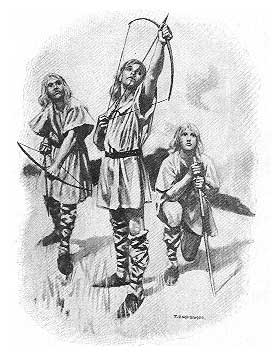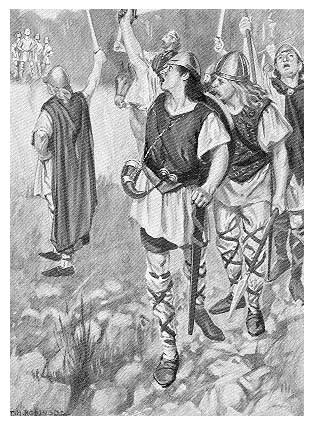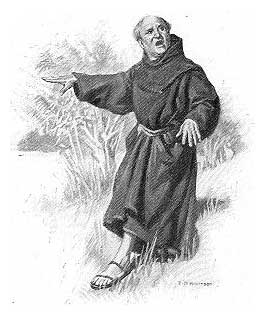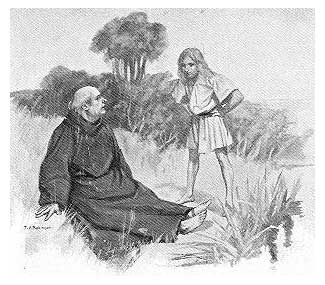Chapter 2 | Boys Will Be Boys | The King's Sons
One of the boys’ amusements had been for one to shoot an arrow as high up as he could, and for his brothers to follow and try and hit the first one sent. Fine practice this in marksmanship, but unsatisfactory and tiring after a few tries, for the arrows flew far, and this time they had brought no young serfs’ sons to retrieve the arrows, one of which took a long time to find.
But it was found at last, just as the head of a man appeared above the distant ridge; and the boys stopped to look, the head being followed by the shoulders and breast of the man, while behind him there was a fringe of something bright and shimmering in the sunshine.
The next minute the boys began to run, for they saw that the object first seen was a mounted man, and what followed the heads of spears borne by a party of quite a hundred men, whose leader had been seen first owing to his being mounted upon an active little horse.
“Where’s Cerda going?” shouted one of the boys.
“There’s a fight somewhere,” said another.
And the other two joined in, crying together:
“Let’s go and see.”
So, in a state of wild excitement and wonder that they had not heard the news of danger before, the boys raced to head off the body of armed men, the first up being greeted by the big bluff leader with a cheery shout.
“What now? What now?” he cried. “Have you boys come to tell us that we are too late, and that the enemy are all slain? Who was it found the Norsemen’s ship?”
“Then the Danes have landed?” cried the eldest boy excitedly.
“Yes,” cried his brother. “I knew that was it.”
“Yes, that’s it, boy,” said the leader, dragging at his horse’s head, for the animal was impatient to go on.

“Where are they?” cried the youngest boy, with his cheeks flushing and eyes sparkling.
“A day’s journey away, my boy. The people over Farringdon way have asked for help, and the King sends me.”
“That’s right,” cried the boy who had last spoken. “We’ll go with you.”
The leader smiled and shook his head, and the band of fine-looking, picked men indulged in a hearty laugh.
“What are you mocking and gibing at?” cried the youngest boy fiercely. “Do you think that because I and my brothers are young we cannot fight?”
“Yes,” cried the eldest brother; “we can shoot an arrow with any of you. Pick out your four best men, Jarl Cerda, and we’ll shoot against them.”
“Yes,” said another. “You know we can shoot well.”
“Do I not?” said the jarl; “for I taught you.”
“Yes, yes; they can all shoot well,” came in concert.
“Oh, yes, they can shoot,” said the leader; “but I have no time to prove it.”
“Of course not,” cried Alfred. “Never mind that. Lead on.”
“I’m afraid we should never catch the Danes if you boys came,” said the jarl solemnly.
“Why?” cried Bald, the eldest.
“Yes, why shouldn’t we?” cried Ethelred.
“Don’t ask him,” said Alfred, frowning.
“Why?”
“Look at his eyes and the corners of his mouth. He’s laughing at us.”
The big jarl’s shoulders began to shake, and his lids half-closed in his mirth, while the eyes of all four boys flashed in their anger.
“Why, of course I’m laughing, my boys,” he said; “but it’s not out of a desire to mock at you. I know you, my brave little fellows, and I hope to come back safe, and to see you all grow up to stark men who will deal well with the Norsemen. But you must wait a bit.”
“No, no,” cried Alfred. “We can stand back and shoot.”
“So can the Danes, my boy; and their arrows are sharp.”
“But we can shoot sharper and quicker than they,” said Ethelred. “Oh, do take us, Jarl Cerda.”
“No, my boy,” said the stout Saxon noble firmly; “I cannot take you. The King stood by and picked out my men, and he said I was to take these and no more. Would you have me give pain to our good Queen Osburga by breaking the King’s commands?”
“No,” said Alfred, with a quick, old-fashioned look. “We cannot do that, boys.”
“Come, that’s bravely spoken, Alfred, boy; I like that,” said the jarl, leaning down from his horse to pat the youngest boy on the shoulder. “Look here, if I come back safely after beating the Danes I’ll bring you one of their winged helmets for a prize.”
“You will?” cried Alfred.
“I promise you I will, my boy,” cried the big Saxon noble, “and trophies for your brothers too.—There, we must go on. Good-bye, my brave boys. Give them a shout, my lads.”

The men waved sword and spear in the air as they marched off and Alfred and his brothers stood watching them till the last twinkling spear had disappeared in the distance, and then the boys turned away with a sigh.
“Oh, I wish I was a man!” said Alfred sadly.
“No use to wish,” said the next brother. “Here, let’s go on down the stream to get some fish.”
The disappointment was soon forgotten, and the boys dashed off downhill as hard as they could go, neither of them hearing a shout, nor seeing the little monk come panting up, to stand gazing ruefully after them and wiping the great drops of perspiration off his face and head.
“Oh, dear!” he said; “it’s a fine thing to be young and strong, and—”
He paused for a few moments to look down at his plump proportions.
”—And light,” he added sadly. “I can’t run as they do.”
He stood perfectly still as he spoke, watching the deep crease in the valley, whose bottom was hidden by clumps of willow and beds of reeds with their dark purply waving blooms.
“I suppose I must go after them,” he sighed. “What can they want down there?”
The little monk sighed again and then started off to follow the boys, trying hard to walk slowly and steadily; but it was all in vain. The hill-side sloped very steeply to the broad bed of willows and reeds far below, making the way very bad for so heavy and inactive a man. Worse still: walking over the short grass in the hot sun had made the bottoms of the monk’s sandals as slippery as glass, and so it was that before he had gone far down the slope he began to talk to himself, at first slowly—then quickly—then in a loud excited way—and lastly he uttered a shout and a cry for help.
“Here,” he said, at first, “I want to go down slowly. It’s too hot to walk fast. Steady! Why, I am going faster!”
Then there was a minute’s pause, and the monk cried excitedly:
“I don’t want to run.” Then: “Oh, dear me, however am I to stop myself?” And directly after: “Oh, do stop me, somebody, or I shall be broken all to bits.” And lastly: “Here, help, help, help!”

Then there was a loud crashing sound, some water flew up, the monk uttered a final “Oh!” and lay perfectly still, listening, for all at once a familiar voice cried:
“Oh, come here, quick! A sheep has gone plosh into the pool.”
Boys were as much boys then as they are now, for directly after these words were uttered Alfred—the Little then—came hurrying as fast as the water would let him wade—splash, splash, splash!—from where he and his brothers had been busily making a dam across the little stream to turn the rushing water aside into another channel so as to leave the unfortunate trout helpless and ready for capture, and as soon as he caught sight of his teacher lying perfectly still he burst into a fit of hearty laughter.
“Come and look! Come and look!” he shouted.
His brothers wanted no further telling, but came splashing up out of the stream to the open shallow muddy bed where the reeds grew, and as soon as they saw the monk’s condition they began to indulge in a bare-legged triumphal war-dance, shrieking with laughter the while.
“Bad boys; bad, thoughtless, wicked boys!” grunted Father Swythe; but he lay perfectly still with arms and legs spread apart as far as they would go.
“Why don’t you stand up and walk out?” cried Fred, at last, taking compassion on his tutor’s awkward plight.
“Because I’m so heavy, boy: I should sink.”
“Oh, no. It isn’t deep there. I’ve often waded about there to look for moorhens’ nests.”
“Yes, my boy; but you’re young and light. I’m very heavy.”
“Yes,” cried one of the others, in high delight; “there’s an arrow depth of water where you are, and quite a bow length of thick mud under that.”
“Oh, dear!” groaned the monk; “don’t laugh at me, my boys. Can’t you help me out?”
“Yes, I’ll get you out,” cried Alfred, and he waded towards his unfortunate tutor, trampling the reeds down with his bare feet, but sinking in up to his knees at every step.
“Mind you don’t get into a hole, Fred!” cried Bald.
“Mind the big luces!” shouted Bert. “There’s a monster lives among those reeds.”
“Oh, they all swam away when Father Swythe fell in,” cried Red. “You have got to mind your toes. The big eels are down amongst the mud.”
The monk groaned at this, and raised his dripping hands above the water, to grasp with each a handful of reeds.
“The eels will go deeper into the mud,” said Alfred sturdily. “Now then, catch hold of my hands, and I’ll pull you out.”
The monk raised one hand very cautiously, and Alfred seized it tightly and began to back, pulling with all his might; but he pulled in vain, for he did not move his tutor an inch.
“Here, I know,” cried Alfred. “You two come and join hands and pull.”
“I’m afraid I’m too heavy,” said Father Swythe.
“I shan’t help,” said Bald maliciously. “Let him stop where he is.”
The monk groaned again, and the three boys outside the reeds laughed with malicious glee.
“If we pull him out he’ll only take us back and begin to teach us to read.”
“Yes, yes, yes,” sighed Father Swythe; “I came to fetch you in. The Queen sent me.”
“Then we won’t help you,” said Bert; laughing. “Let’s go and finish getting our fish, and then go back. When they ask where he is we’ll tell them, and then some of the shepherds can come with wattle hurdles and get him out.”
“Oh, dear!” groaned the monk. “After all my teaching, for you boys to be as bad as this! Why, if you leave me I shall be drowned!”
“Oh, no,” said Red merrily. “You’ve only to keep holding your face up.”
“Yes,” said Bert; “and that will send your legs down till you’ll be standing up in the mud and water.”
“And all the big flies and things will come and buzz about and settle on your crown. Come along, Fred, and finish the dam.”
“If we finish the dam,” said Alfred seriously, “all the water will run in here and make it deeper.”
“Well, then he can swim out. You can swim, can’t you?”
“No, no, no,” said the monk sadly. “I never learned.”
“What a pity!” said Red, laughing.
“You ought to have learned to swim instead of learning so much Latin,” cried Bert.
“There isn’t time to learn everything, my boys,” said the monk sadly. “I’m obliged to try and teach you all: the King and Queen sent for me that I might. Please help me out.”
“We’re not going to,” cried Bald. “Come along, boys. He ought to have learned to swim.”
Bald began to move away, and the monk groaned again.
“Come along, Fred,” cried Bert, and the monk turned his head sidewise so as to look piteously at the youngest boy.
“No, I’m not coming. I’m going to stop and help Father Swythe.”
“Hah!” sighed the monk, and he squeezed Alfred’s hand.
“No, you’re not,” cried Bald fiercely; “you’re coming with us. Come along. He will not sink.”
“I shan’t come!” said Alfred sturdily.
“What? Here, boys, let’s fetch him out.”
There was a rush made towards where the boy stood knee-deep, and he snatched his hand free from the monk’s grasp, turned half-round, stooped a little, and as his eldest brother came wading in among the reeds he scooped up the water and saluted him with a heavy shower right in the face, drenching him so that he turned tail and hurried back, the other two laughingly backing out of reach.
“Oh, you!” shouted. Bald. “Come out, or I’ll hold you right under the water till you can’t breathe.”
“Come along then,” cried Alfred boldly, and he sent another shower of water after his brother, wetting him behind now. “You’ll be just as wet as I shall first.”
“You come out!”
“I shan’t! You come here, if you dare!”
“Come and help me, boys,” cried Bald; but the others only laughed.
“Come yourself, if you dare! Father Swythe will help me, and we’ll duck you.”
“Urrr!” growled Bald, stamping with rage. Then: “Never mind, boys: let them stop together. Give him a Latin lesson, Father Swythe.”
“You stop a moment, all three of you,” cried Alfred sharply. “You’re not going away to leave Father Swythe like this. Go and fetch the big fir-pole that we laid across to begin the dam. If that’s laid down here Father Swythe can pull himself out.”
“Fetch it yourself!” cried Bald angrily. “We’re not your serfs.”
“I’m going to stop with Father Swythe,” cried Alfred.
“Good boy! good boy!” whispered the monk.
“And look here,” cried Alfred angrily: “it’s cruel and wicked not to help him, and if you don’t go I shall tell mother, and father will have you all punished severely.”
“Tell, if you dare!” cried Bald, wringing out some of the water from the front of his tunic-like gown. “Come along, boys, and we’ll get the fish without him.”
Bald started off back to the stream, and the others followed him, the monk watching with piteous eyes till they were out of sight, when he turned his doleful, wrinkled face to his young companion, to tell him what he already knew.
“They’re gone,” he said sadly.
“Yes,” said Alfred, laughing; “but only to fetch the fir-pole.”
“Do you think so?” sighed the monk.
“Yes; they’re afraid of my telling mother and making her angry. She doesn’t like us to do cruel things: she’d tell us we were like the Danes. They’ll come back soon with the pole, and then if you hold one end we can pull the other and draw you out. But I say, Father Swythe, you’re big and strong. Don’t you think if you were to try, you could get out on to the grass? Try and struggle out before they come back.”
“But if I began to sink—”
“Then I should run and shout to the shepherds to come and pull you out.”
“But I shouldn’t like you to leave me to sink alone, my boy.”
“It would be a long, long time before you were regularly mired,” said the boy. “Now, you try! Give me both hands.”
Father Swythe did as he was told, and, while his young companion threw himself back and dragged, the monk kicked and struggled bravely, and with such good effect that, to the surprise of both, he glided slowly through the reeds, and in less than a minute he sat up panting on the short grass, with the water streaming from the front of his gown.

“That was very brave and nice of you, my boy,” he said, as he rose to his feet, “and I shall never forget it.”
“Oh, it was easy enough!” said Fred, laughing. “There, let’s go over the hill, and when the boys come back they’ll begin poking the pole about down among the reeds, and think we’re both smothered. No: here they come. Look, they’re bringing the pole.”
Surely enough they were; but the monk did not stop. He began trudging up hill through the hot sunshine so as to get back to take off his wet cassock and put on an old one that was dry, Fred choosing to stay with him and to talk about the bees and birds and flowers they passed, of which the monk could talk in an interesting way, even though it was a thousand years ago.
As for the three others, they threw down the pole as soon as they saw that the monk was safe, and then followed at a distance to the big castle-like house—the palace in which the King dwelt; but there was very little reading that afternoon; for there was too much to say about the fresh attack made by the Danes, who had come up the river and landed, to ravage the country. Ethelwulf, who was not a very warlike King, was very anxious as to the result of the fight, and was busy getting more men together by means of his jarls or chiefs, so as to go to the help of those who had already set out.
In fact, instead of studying Latin and learning to write, the boys stood about learning something of the art of war, and what was to be done to defend their country when an invading enemy was ravaging the land.

